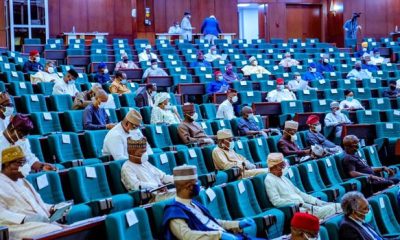Business
Experts Ponder on the Proposed Shipping Regulatory Bill

*Experts Ponder on the Proposed Shipping Regulatory Bill
The Nigerian Shipping and Port Economic Regulatory Agency bill has undergone multiple revisions, with the 2024 iteration duplicating the powers and functions of the Nigerian Maritime Administration and Safety Agency (NIMASA) and other Ministries, Departments, and Agencies (MDAs) under the Ministry of Marine and Blue Economy. This proposed shipping regulatory bill has sparked intense debate and discussion among stakeholders in the maritime industry, with concerns raised regarding potential increases in governance costs. Nevertheless, numerous experts believe that a regulatory framework is essential for the industry’s growth and development.
In a public hearing that was held this year, stakeholders convened to share their perspectives on the bill, and the consensus was clear: the Shippers’ Regulatory Bill is the preferred option. The crux of the debate centers on whether the proposed bill will usher in a new era of streamlined governance and enhanced regulatory oversight or burden shippers with exorbitant costs. Proponents of the bill argue that it represents a long-overdue modernization of the regulatory framework, designed to address the evolving needs of the shipping industry in response to rapid global trade changes and technological advancements.
One of the bill’s sponsors and Chairman of the House Committee on Shipping Services and Related Matters, Hon. Abdussamad Dasuki, quoting a gazette, said the Nigerian Shippers’ Council was made the port economic regulator in 2015 by the Federal Government, a status that needed to be formalized through legislation. “The Federal Government noted that the objective of the regulation is to create an effective regulatory regime for the Nigerian ports after the concession of the ports. Port does not mean the Nigerian Ports Authority alone. It also means all the stakeholders in the ports, for the control of tariffs, rates, charges, and other related economic services,” Dasuki.
Experts from various sectors of the maritime industry presented their views on why they believe the bill holds the key to a more efficient and competitive shipping landscape. A prevailing argument put forth by stakeholders is the need for a robust regulatory framework that can adapt to the rapid changes in global trade and technological advancements. However, a key concern raised by stakeholders is the potential for the bill to establish a new agency with overlapping responsibilities with existing bodies, leading to inefficiencies and increased government spending. Furthermore, stakeholders point out that the bill appears to contradict the Oronsaye Report, a government-commissioned study that recommended consolidating agencies to streamline governance, thereby minimizing bureaucratic redundancy and enhancing the overall efficiency of regulatory oversight.
According to industry experts present at the public hearing, the proposed bill presents a strategic opportunity to harmonize regulatory standards and practices, thereby fostering a more cohesive and responsive ecosystem for shippers. This harmonization, they emphasize, will not only enhance operational efficiency and resilience in the face of global economic fluctuations but also attract investment, promote economic growth, and ensure safety, security, and efficiency.
Dr. Okonji, a renowned maritime expert, opined, “The industry has long awaited a regulatory framework, which will boost investment, economic growth, and overall development by ensuring safety, security, and efficiency.” Mr. Adekola, another expert, added, “The Shippers’ Council will establish a level playing field, curtail unfair practices, and safeguard the interests of shippers, leading to a more equitable and competitive industry.”
Mrs. Uche, a shipowner, expressed her support for the bill, stating, “Regulation will standardize operations, reduce administrative burdens, and enhance Nigeria’s maritime industry reputation globally, making it more competitive and attractive to investors.” Mr. Hassan, a representative of the Nigerian Shippers’ Council, emphasized the need for a regulatory framework that aligns with international best practices, dispelling rumors of contradictions with the presidential policy. Instead, he affirmed that the bill complements the policy, providing a framework for economic regulation that contributes to the sector’s overall development and efficiency.
Proponents of the bill also highlighted its potential to improve transparency and accountability, mitigating risks and enhancing trust in the regulatory process. They argued that the bill’s provisions for clearer guidelines and oversight mechanisms are essential for promoting fair competition and safeguarding shippers’ interests in a rapidly evolving global market. By fostering a more transparent and accountable regulatory environment, the bill aims to protect shippers’ interests, promote fair competition, and enhance the overall efficiency of the maritime industry.
Moreover, the proposed bill has garnered support from experts who emphasize the necessity of harmonizing regulatory frameworks with international best practices. They argue that the bill’s provisions for greater alignment with global standards will enhance the industry’s reputation on the international stage, potentially leading to new opportunities for collaboration and trade partnerships.
It is also noteworthy to state that, various groups and organizations believe that it is imperative for Nigeria to end the dominance of critical sectors by powerful individuals hiding behind organizations to block reforms necessary to align the country with global best practices. They urge the House of Representatives to remain resolute and not be swayed by veiled blackmail and threats disguised as expert opinions during the consideration of this strategic bill.
After a thorough and meticulous analysis of the bill’s provisions, Dr. Ahmed, a renowned expert in the field, was in complete concurrence with the prevailing sentiment, and in his esteemed opinion, he articulated the following: “The overwhelming consensus among experts and stakeholders is that the bill will effectively tap into the Nigerian Shippers’ Council’s vast reservoir of expertise and resources in the transportation sector, thereby ensuring a regulatory framework that is both efficacious and impactful. By leveraging the council’s extensive knowledge and experience, the bill is poised to introduce comprehensive and well-informed regulatory measures, culminating in a significantly enhanced economic landscape that fosters sustainable growth, improved market dynamics, and increased competitiveness within the industry. The bill provides a clear, comprehensive, and well-structured economic framework for the transport sector, laying the groundwork for a transformative shift in the industry, ultimately contributing to the nation’s economic development, prosperity, and overall well-being. This thoughtful and meticulous approach to regulation is a testament to the bill’s potential to drive meaningful change and promote a more robust and resilient economy.”
In summary, the Nigerian Shippers Council Bill is poised to bring about transformative changes in the transportation sector, promoting efficiency, aligning with global best practices, leveraging existing resources, and enhancing the economic framework of the transport sector. By doing so, the bill will have a profound impact on the industry, fostering a more robust, competitive, and sustainable transportation system that supports the nation’s economic growth and development.
While the proposed bill has raised concerns about potential increases in governance costs, proponents are quick to highlight the long-term benefits of a more robust and adaptive regulatory framework. They argue that the bill’s provisions for stakeholder engagement and feedback mechanisms will ensure that the regulatory framework remains responsive to the evolving needs of shippers, thereby offsetting initial implementation costs with sustained long-term gains. By fostering a more inclusive and responsive regulatory environment, the bill aims to promote the overall development and efficiency of the industry.
In conclusion, stakeholders are unanimous in their conviction that the Shippers’ Council is the most viable solution for the advancement of Nigeria’s maritime industry. With a meticulously designed regulatory framework, the industry is poised to become a significant driver of economic growth and development, as aptly emphasized by Mr. Adekola: “Regulation is not a burden but a necessary step towards a sustainable and prosperous maritime industry.” As the maritime industry navigates the complex waters of regulatory reform, the collective voices of experts and stakeholders converge on the belief that the proposed Shipping Regulatory Bill represents a pivotal step towards a more resilient, competitive, and globally integrated shipping landscape, characterized by enhanced efficiency, sustainability, and prosperity.
While the ultimate fate of the proposed bill – whether it is enacted, amended, or rejected altogether – remains uncertain, the public hearing process presents a crucial opportunity for stakeholders to articulate their concerns and ensure that any new regulations are effective, efficient, and aligned with the industry’s aspirations.
As the debate continues to unfold, it is evident that the bill has become a focal point for the industry’s collective aspirations, reflecting a shared commitment to charting a course towards a brighter future for shippers and the maritime ecosystem as a whole. The bill’s existential significance is undeniable, as it holds the key to unlocking a more sustainable, resilient, and competitive maritime industry, poised to make a meaningful contribution to the nation’s economic growth and development.
Business
Nigeria’s Inflation Drops to 15.10% as NBS Reports Deflationary Trend

Nigeria’s headline inflation rate declined to 15.10 per cent in January 2026, marking a significant drop from 27.61 per cent recorded in January 2025, according to the latest Consumer Price Index (CPI) report released by the National Bureau of Statistics.
The report also showed that month-on-month inflation recorded a deflationary trend of –2.88 per cent, representing a 3.42 percentage-point decrease compared to December 2025. Analysts say the development signals easing price pressures across key sectors of the economy.
Food inflation stood at 8.89 per cent year-on-year, down from 29.63 per cent in January 2025. On a month-on-month basis, food prices declined by 6.02 per cent, reflecting lower costs in several staple commodities.
The data suggests a sustained downward trajectory in inflation over the past 12 months, pointing to improving macroeconomic stability.
The administration of President Bola Ahmed Tinubu has consistently attributed recent economic adjustments to ongoing fiscal and monetary reforms aimed at stabilising prices, boosting agricultural output, and strengthening domestic supply chains.
Economic analysts note that while the latest figures indicate progress, sustaining the downward trend will depend on continued policy discipline, exchange rate stability, and improvements in food production and distribution.
The January report provides one of the clearest indications yet that inflationary pressures, which surged in early 2025, may be moderating.
Bank
Alpha Morgan to Host 19th Economic Review Webinar

Alpha Morgan to Host 19th Economic Review Webinar
In an economy shaped by constant shifts, the edge often belongs to those with the right information.
On Wednesday, February 25, 2026, Alpha Morgan Bank will host the 19th edition of its Economic Review Webinar, a high-level thought leadership session designed to equip businesses, investors, and individuals with timely financial and economic insight.
The session, which will hold live on Zoom at 10:00am WAT and will feature economist Bismarck Rewane, who will examine the key signals influencing Nigeria’s economic direction in 2026, including policy trends, market movements, and global developments shaping the local landscape.
With a consistent track record of delivering clarity in uncertain times, the Alpha Morgan Economic Review continues to provide practical context for decision-making in a dynamic environment.
Registration for the 19th Alpha Morgan Economic Review is free and can be completed via https://bit.ly/registeramerseries19
It is a bi-monthly platform that is open to the public and is held virtually.
Visit www.alphamorganbank to know more.
Business
GTBank Launches Quick Airtime Loan at 2.95%

GTBank Launches Quick Airtime Loan at 2.95%
Guaranty Trust Bank Ltd (GTBank), the flagship banking franchise of GTCO Plc, Africa’s leading financial services group, today announced the launch of Quick Airtime Loan, an innovative digital solution that gives customers instant access to airtime when they run out of call credit and have limited funds in their bank accounts, ensuring customers can stay connected when it matters most.
In today’s always-on world, running out of airtime is more than a minor inconvenience. It can mean missed opportunities, disrupted plans, and lost connections, often at the very moment when funds are tight, and options are limited. Quick Airtime Loan was created to solve this problem, offering customers instant access to airtime on credit, directly from their bank. With Quick Airtime Loan, eligible GTBank customers can access from ₦100 and up to ₦10,000 by dialing *737*90#. Available across all major mobile networks in Nigeria, the service will soon expand to include data loans, further strengthening its proposition as a reliable on-demand platform.
For years, the airtime credit market has been dominated by Telcos, where charges for this service are at 15%. GTBank is now changing the narrative by offering a customer-centric, bank-led digital alternative priced at 2.95%. Built on transparency, convenience and affordability, Quick Airtime Loan has the potential to broaden access to airtime, deliver meaningful cost savings for millions of Nigerians, and redefine how financial services show up in everyday life, not just in banking moments.
Commenting on the product launch, Miriam Olusanya, Managing Director of Guaranty Trust Bank Ltd, said: “Quick Airtime Loan reflects GTBank’s continued focus on delivering digital solutions that are relevant, accessible, and built around real customer needs. The solution underscores the power of a connected financial ecosystem, combining GTBank’s digital reach and lending expertise with the capabilities of HabariPay to deliver a smooth, end-to-end experience. By leveraging unique strengths across the Group, we are able to accelerate innovation, strengthen execution, and deliver a more integrated customer experience across all our service channels.”
Importantly, Quick Airtime Loan highlights GTCO’s evolution as a fully diversified financial services group. Leveraging HabariPay’s Squad, the solution reinforces the Group’s ecosystem proposition by bringing together banking, payment technology, and digital channels to deliver intuitive, one-stop experiences for customers.
With this new product launch, Guaranty Trust Bank is extending its legacy of pioneering digital-first solutions that have redefined customer access to financial services across the industry, building on the proven strength of its widely adopted QuickCredit offering and the convenience of the Bank’s iconic *737# USSD Banking platform.
About Guaranty Trust Bank
Guaranty Trust Bank (GTBank) is the flagship banking franchise of GTCO Plc, a leading financial services group with a strong presence across Africa and the United Kingdom. The Bank is widely recognized for its leadership in digital banking, customer experience, and innovative financial solutions that deliver value to individuals, businesses, and communities.
About HabariPay
HabariPay is the payments fintech subsidiary of GTCO Plc, focused on enabling fast, secure, and accessible digital payments for individuals and businesses. By integrating payments and digital technology, HabariPay supports innovative services that make everyday financial interactions simpler and more seamless.
Enquiries:
GTCO
Group Corporate Communication
[email protected]
+234-1-2715227
www.gtcoplc.com
-

 celebrity radar - gossips6 months ago
celebrity radar - gossips6 months agoWhy Babangida’s Hilltop Home Became Nigeria’s Political “Mecca”
-

 society6 months ago
society6 months agoPower is a Loan, Not a Possession: The Sacred Duty of Planting People
-

 society5 months ago
society5 months agoReligion: Africa’s Oldest Weapon of Enslavement and the Forgotten Truth
-

 news6 months ago
news6 months agoTHE APPOINTMENT OF WASIU AYINDE BY THE FEDERAL GOVERNMENT AS AN AMBASSADOR SOUNDS EMBARRASSING









